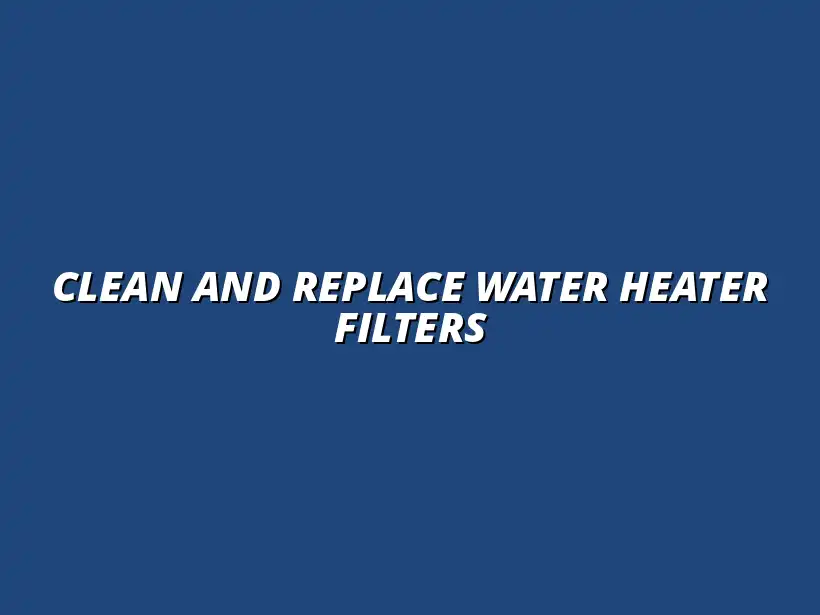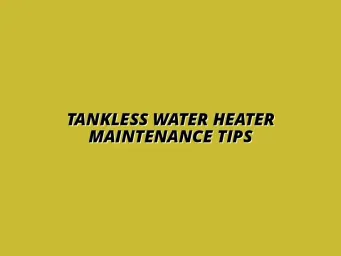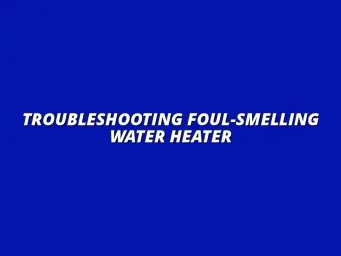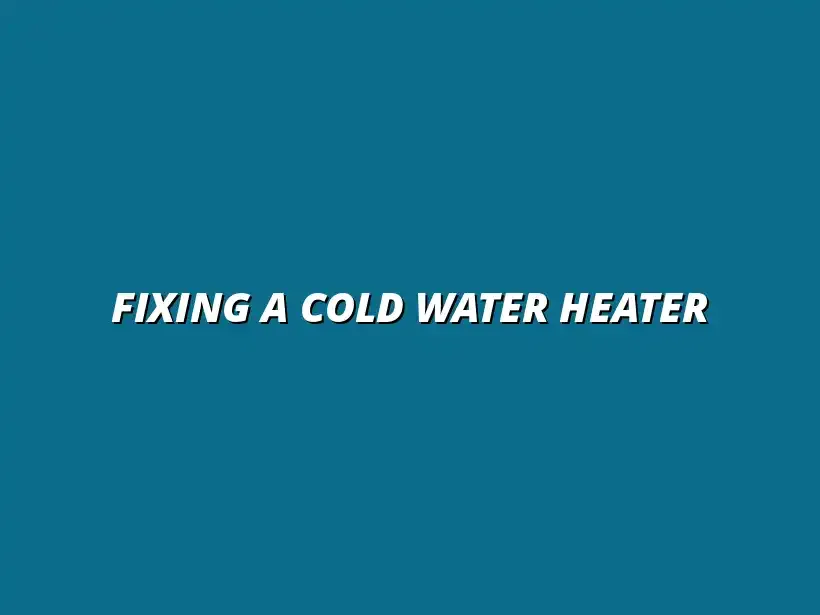
Clean and Replace Water Heater Filters
Understanding Water Heater Filters and Their Importance
Water heater filters play a crucial role in maintaining the efficiency and longevity of your heating system. They help to remove impurities and sediments from the water, ensuring that your water heater operates smoothly. By understanding how these filters work, we can appreciate their importance in protecting our home’s plumbing and water quality.
When we think about our water heaters, we often focus on their heating capabilities. However, filters are equally essential because they prevent the buildup of minerals and debris that can cause blockages or even damage. Regular maintenance of these filters can save you from costly repairs in the long run! For more on maintaining your water heater efficiently, check out this helpful guide: maintain your water heater efficiently.
The Role of Water Heater Filters in System Efficiency
Water heater filters contribute significantly to the overall efficiency of your system. They help keep the water clean, which allows the heater to function at its best. A clean system can lead to lower energy bills and a longer lifespan for your unit.
By filtering out contaminants, these devices reduce wear and tear on the heating elements, which translates to less energy consumption. This efficiency not only benefits your wallet but also promotes a healthier home environment!
- Improved water quality
- Reduced sediment buildup
- Increased energy efficiency
How Filters Improve Water Quality and System Longevity
Water quality is paramount in any home. By effectively removing rust, sediment, and other impurities, water heater filters ensure that you receive clean and safe water. This is not only great for drinking but also for bathing and cooking! Learning how to easily clean your water heater can significantly improve water quality. See this guide on cleaning your water heater for more information.
Moreover, keeping your water heater clean can extend its lifespan. Fewer contaminants mean that the system doesn’t have to work as hard, which leads to less wear and tear. This proactive approach could save you from having to replace your heater too soon, thereby saving you money!
Common Types of Water Heater Filters Used in Homes
There are several types of water heater filters that homeowners can choose from. Each type serves a specific purpose and can be suited for different needs. Understanding these options can help you make an informed decision for your home.
- Screen Filters: These are designed to catch larger particles and are usually easy to clean.
- Cartridge Filters: These filters capture finer sediments and may need to be replaced periodically.
- Sediment Filters: They specifically target dirt and debris in the water supply. Addressing sediment buildup is crucial for water heater longevity. Learn how to fix sediment buildup in water heaters here.
Choosing the right filter can significantly impact your water heater's performance. It's worth considering which type aligns best with your specific needs and water conditions!
Identifying When to Clean or Replace Water Heater Filters
Knowing when to clean or replace your water heater filters is essential for maintaining efficient operation. Filters can become clogged over time, leading to performance issues. Keeping an eye out for certain signs can help you take action before a problem escalates.
Regularly checking your filters allows you to catch any issues early on. By staying proactive, you can ensure that your water heater continues to run smoothly and reliably! Regular checks are part of good bathroom water heater maintenance. Check out these tips for regular checks.
Key Signs Your Water Heater Filters Need Attention
There are several indicators that your water heater filters may need cleaning or replacing. Being aware of these signs can save you from more extensive repairs later on. Here are some key signs to watch for:
- Discolored or rusty water
- Unusual noises from the water heater
- Poor water pressure
Visual Indicators of Clogged Filters
One of the easiest ways to check if your filters are clogged is by observing any visible changes. Look for signs such as:
- Cloudy water
- Visible debris in the water
- Rusty or dirty filters
These visual cues can help you determine if it’s time for a cleaning or a replacement. Ignoring them could lead to bigger issues down the line!
Performance Issues Linked to Filter Problems
Performance problems are often a clear signal that your water heater filters require attention. If you notice a decrease in hot water availability or inconsistent water temperatures, it might be due to blocked filters. Addressing these issues promptly can help restore your system's efficiency. If you're experiencing drainage issues, this could also indicate a problem with your water heater. Check out tips on unclogging your drain.
Additionally, strange noises or leaks can indicate that the filters are not doing their job properly. Being aware of these performance issues allows you to take action quickly!
Step-by-Step Guide to Cleaning Water Heater Filters
Cleaning your water heater filters is crucial for maintaining efficiency and prolonging the life of your system. Before diving into the cleaning process, I recommend preparing your water heater properly. This ensures a smooth cleaning experience and minimizes the chance of accidents.
First, get a checklist ready. Gather all necessary tools and supplies so you won't need to stop midway. Having everything at your fingertips makes the task more manageable and less stressful! For more on easily flushing your water heater, see this guide.
Preparing Your Water Heater for Cleaning
Before you start cleaning, it’s essential to shut down your water heater safely. This prevents any mishaps during the process. Begin by turning off the power source, whether it’s gas or electric, to avoid any operational issues or accidents.
Next, you should turn off the water supply leading to the heater. This step is important to prevent any water flow while you’re accessing the filter, making the process easier and cleaner. If you’ve never done this, locating the shut-off valve might take a little time, so be patient!
Shutting Down the Water Heater Safely
Make sure you follow these steps to shut down your water heater safely:
- Turn off the power supply: For electric heaters, unplug the unit or switch off the circuit breaker. For gas heaters, turn the thermostat to the "off" position.
- Shut off the main water supply valve. This could be near the heater or at the main line entry point.
- Allow the heater to cool down. If it's been running, wait a while before proceeding.
Once you’ve done this, you can proceed to access the filter without any worries!
Accessing the Filter: Location and Removal Techniques
Now that your heater is off, it's time to find the filter. Depending on your water heater model, the filter location can vary. Often, it’s located near the inlet or outlet pipes, or sometimes inside the unit itself.
To remove the filter, you’ll need the right tools—usually a screwdriver or wrench. Make sure you have these ready to avoid any delays. Follow the specific instructions for your model, as the removal process may differ slightly.
Cleaning Techniques for Different Filter Types
Different filters require different cleaning methods to ensure they function optimally. Understanding how to clean each type of filter will help maintain the quality of your water heater.
Some common types of filters include screen filters, cartridge filters, and sediment filters. Knowing the right cleaning technique for each will save you time and effort in the long run!
How to Clean Screen and Cartridge Filters
Cleaning screen and cartridge filters is relatively straightforward. Here’s a step-by-step guide:
- Remove the filter from its housing carefully.
- Rinse under warm water to remove loose debris and sediment.
- For screen filters, use a soft brush to scrub gently if necessary.
- Let the filter air dry completely before reinstalling it.
These steps will help keep your filters in good condition and enhance the performance of your water heater!
Strategies for Maintaining Sediment Filters
Sediment filters require a little more attention. Here are some effective strategies to maintain them:
- Inspect regularly for signs of buildup or clogging.
- Flush the filter periodically to remove accumulated sediment.
- Replace the filter as per the manufacturer’s recommendations if cleaning is insufficient.
By following these strategies, you can prolong the life of your sediment filters and ensure better water quality.
Replacing Water Heater Filters: When and How
Sometimes, cleaning isn’t enough, and it becomes necessary to replace your water heater filters. Recognizing when a filter needs replacing is key to maintaining your system's efficiency.
I find it helpful to keep an eye on the condition of the filters regularly. This way, I can catch any issues early and take action before they escalate!
Identifying When a Filter Needs Replacement
Knowing when to replace a filter is vital. Here are some signs that indicate a replacement is necessary:
- Visible damage, such as cracks or tears in the filter.
- Excessive buildup of sediment that cleaning doesn’t resolve.
- Unusual changes in water quality or flow rate.
Being aware of these signs can save you from future headaches and ensure your water heater operates efficiently!
Evaluating Damage and Wear and Tear
When evaluating the condition of your filter, look for:
- Physical damage: Check for any visible cracks, holes, or deterioration.
- Performance issues: Notice any changes in water flow or temperature.
If you spot any of these, it’s time for a replacement! For plumbing issues in Birmingham, consider contacting a local plumber. Check out this link for plumbers in Billesley, Birmingham.
Assessing Filter Lifespan and Manufacturer Recommendations
Different filters have varying lifespans based on their design and usage. Always refer to the manufacturer’s guidelines regarding how often to replace them. This can help you gauge when to make the switch without guessing.
Generally, it’s recommended to keep a record of your filter replacements to track when they were last changed. This will streamline your maintenance schedule significantly!
A Step-by-Step Approach to Filter Replacement
When you’re ready to replace a filter, it’s important to follow a systematic approach. This ensures you do it correctly and safely.
Start by gathering the necessary tools and a new filter that matches your system’s specifications. Having everything on hand can make the process quicker and more efficient!
Removing the Old Filter: Tips and Tricks
Here’s how to remove the old filter effectively:
- Follow the previous steps to safely shut down the water heater.
- Carefully disconnect the old filter from its housing.
- Dispose of the old filter according to local regulations.
Taking care during this step will prevent any damage to the water heater components.
Installing the New Filter: Ensuring a Proper Fit
Once the old filter is out, it’s time to install the new one. Make sure to:
- Align the new filter correctly with the housing.
- Secure it tightly to avoid any leaks.
- Reconnect the water supply gently, checking for any signs of leakage.
By ensuring a proper fit, you’ll help your water heater work efficiently!
Common Questions and Troubleshooting Tips
As you clean or replace your water heater filters, you might have some questions. Addressing these common queries can save you time and frustration!
Regular maintenance is the key to ensuring your water heater runs smoothly, so don’t hesitate to ask for help if you’re unsure about anything.
Addressing Frequently Asked Questions
Here are some common questions I get asked about water heater filters:
How Often Should I Clean My Water Heater Filter?
The frequency of cleaning will depend on your water quality and usage. Generally, I recommend checking your filters every three to six months. If you notice any changes in water quality, consider cleaning them sooner!
What Are the Risks of Neglecting Filter Maintenance?
Neglecting to maintain your filters can lead to numerous issues:
- Reduced efficiency and increased energy bills.
- Damaged water heater components over time.
- Poor water quality affecting your daily use.
Staying on top of maintenance can prevent these headaches in the future!
Troubleshooting Common Issues Post-Cleaning or Replacement
Even after cleaning or replacement, you might encounter some issues. Knowing how to troubleshoot these can save you time and effort!
Identifying and Resolving Leaks
If you find leaks after cleaning or replacing a filter, check the following:
- Ensure all connections are tight and secure.
- Look for any worn-out seals or gaskets that may need replacing.
- Inspect the filter housing for any cracks or damage.
Taking the time to address leaks promptly can prevent further damage!
Ensuring Optimal Temperature and Pressure Settings
After maintenance, it’s essential to check your water heater’s temperature and pressure settings. Make sure to:
- Set the temperature to the recommended level, usually around 120°F.
- Monitor the pressure gauge to ensure it stays within the safe range.
Adjusting these settings can help your system run efficiently!
Final Thoughts on Maintaining Your Water Heater Filters
Maintaining your water heater filters is a crucial step in ensuring a long-lasting and efficient system. Establishing a routine schedule will keep your water quality high and your heater running smoothly.
With a little effort and mindfulness, you can significantly impact the performance of your water heater!
Establishing a Maintenance Schedule for Longevity
Creating a maintenance schedule is simple and effective. Here’s how to do it:
- Decide on specific dates for cleaning and inspections.
- Set reminders on your phone or calendar to keep on track.
- Include filter replacements based on manufacturer recommendations.
Having a set schedule ensures you don’t forget any essential maintenance!
Creating a Checklist for Regular Upkeep
A checklist can be a handy tool for maintenance. Consider including:
- Dates of filter cleaning and replacement.
- Notes on any issues you encounter.
- Future tasks to monitor closely.
By keeping track, you’ll stay organized and proactive!
Benefits of Consistent Maintenance on Overall System Performance
Consistent maintenance leads to numerous benefits, such as:
- Improved water quality for your home.
- Lower energy costs due to increased efficiency.
- Extended lifespan of your water heater.
These advantages make regular maintenance not just a chore, but a valuable investment!
Encouragement for DIY Maintenance
Taking on DIY maintenance of your water heater filters can feel rewarding. It empowers you with knowledge and skills you can use for future home projects!
Plus, I find that actively participating in the care of my home gives me peace of mind and confidence in my abilities!
The Value of Knowledge in Homeownership
Understanding how your water heater works, including its filters, is crucial. The more you know, the better prepared you are to tackle issues as they arise!
Knowledge is a powerful tool, especially in homeownership, and it helps you make informed decisions about maintenance and repairs.
Resources for Further Learning and Assistance
If you’re looking for more information on water heater maintenance, consider these resources:
- Your heater’s user manual for manufacturer-specific guidance.
- Online forums or communities dedicated to home maintenance.
- Local hardware stores for workshops or expert advice.
Utilizing these resources can enhance your understanding and competence in maintaining your home!




